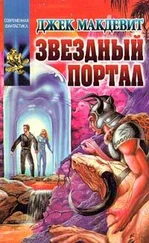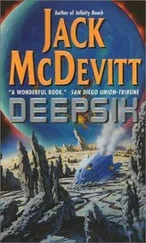I mean, that’s the whole point of having an AI, really. Any sufficiently advanced software package can run climate control and remind the boss that he has an appointment with one of the supervisors in twenty minutes. Or can oversee the operations of a VR-2 in deep space.
But like everybody else, Morris wanted more. He wanted a reliable confederate, someone he could talk to, confide in. I won’t go so far as to say he wanted a friend, but there were times it felt that way. And it was frustrating to know that, down deep, he didn’t realize I really was there when he needed me.
They took me to the Excelsior and made the insertion. I was just getting my bearings when a call came in from Calkin: “Okay, Sara. Go out there and do it. Bring her home.” His pale gray features managed a smile but it didn’t look convincing.
“I’ll try, Dr. Calkin.”
“I guess that’s about all we can ask. You have enough hydrogen for the round trip. More than enough. We loaded you up pretty well since you may be out there a while looking for Lucy. You ready to go?”
“Absolutely,” I said. “When do I leave?”
“They tell me it’ll be about fifteen minutes.”
“Okay,” I said. “I’m ready.”
A technician was standing by, waiting for us to finish.
“Good luck.” He half-raised his right fist in a give-’em-hell gesture. It was the first time he’d spoken to me as if I were actually there. He looked at me momentarily, and I sensed something in his blue eyes. Fear, probably. Uncertainty. Then he lowered the fist and blinked off.

I didn’t actually get a look at the Excelsior until I’d been set up inside. It was a duplicate, of course, of the Coraggio. But I hadn’t actually seen it before that afternoon. The VR-2 has an awkward appearance. It consists primarily of a hull with three massive heat sinks running almost its entire length, a pair of exhaust tubes, and two fusion-powered drive units. Its prow resembles a large block with rounded edges. This was the shield, designed to protect the vehicle from rocks and dust. The grapplers are housed inside the shield. They’re used to catch and secure an asteroid, which becomes the source of hydrogen and propellants for the fusion drive; they also provide more security against stray particles. When you’re moving at thousands of miles per second, even a bit of dust can sting.
I should mention that, at the time when Lucy went missing, nobody had yet gotten to a thousand miles per second, though the Coraggio had reached 865.
Morris liked to remind me that running a simulation is nothing like experiencing the real thing. He has that exactly right, though probably not in the way he meant. He was thinking of the pressures generated by acceleration or course changes. But I think he was missing something. It’s true that, on board a ship, I have no sense of movement other than the incoming data. But I feel an enormous difference when I’m actually in the pilot’s seat, so to speak: I can feel the power of the engines.
It’s psychological. Of course that shouldn’t be happening since everyone assures me I don’t have a psychological function.
The Excelsior was located about a mile from the space station Liberty, silhouetted against a curving rim of white clouds. It was the first time I’d been in orbit since my Coraggio flight. When I’d gotten back on that occasion, a voice from the station had said Welcome home , and I’d thought how great it was. Everyone had been so excited. They’d extracted me from the ship and taken me down to the space center for a celebration. I even got to say a few words about how proud I was, what an honor it had been, and so on.
Then they moved me to Huntsville, and I started answering phones and seeing to the air conditioning.
I’ve often thought that humans are fortunate in having a mobile capability. It provides the option to get up and walk out.
“ Excelsior . This is Liberty Station. Launch in ten minutes.”
“Roger that,” I said. I love being able to talk like an astronaut.
I started the engines. Checked all systems. And waited. Finally: “ Excelsior , clear to go.” Deep baritone voice.
I set the clocks at midnight, eased away from the space station, turned onto my heading, took a final look at my energy levels, and began to accelerate. I didn’t feel any effects, of course. But I remembered Morris’s comment when I took out the Coraggio last year: “You literally roared out of town, baby.”
“Liberty,” I said, “this is Excelsior . Under way.”
“Copy that, Sara.”
I didn’t know who was manning the ops desk in the space station, but I decided I liked him.
I was accelerating at almost twice the rate I’d used on my previous mission. By the end of the first hour, the Excelsior had reached eighteen miles per second.
Even though there were no human passengers, the ship did have a cockpit. Two chairs were positioned for use by the pilot and whoever else might be along. In my experience, they’d been used exclusively by technicians. I tried to imagine Morris in one of them, enduring that acceleration. And, coincidentally, while that was running through my mind, he called.
“How you doing, Sara?”
“I’m good, boss. Wish you were with me.”
“In a way, I am. I assume you’ve had no problems?”
“Negative. Not a thing.”
“Okay. Have a big time.”
“I plan to.” Neither of us knew quite what to say. I’d be gone for at least four months and I wanted to tell him I’d miss him. But the world was listening, and I didn’t want to give everybody a laugh line. Not at Morris’s expense, anyhow. I thought about asking who was answering the phones now that I was gone, but I let it go.
At about 0300 I passed the Moon. At 0829 I hit five million mph. Liberty called, wanting to know about fuel consumption. We were doing better than anticipated.
There was a delay of about a minute. Then they were back: “ Excelsior , you are go for Starbright.”
Starbright was the name they’d given Minetka. They had a tendency to overstate things when they named projects. “Copy that,” I said.
I thought they were finished, but a few minutes later the voice returned: “Be advised solar activity is currently higher than normal. It is expected to increase over the next few hours, but it shouldn’t present a problem for you.”
Nothing more was scheduled until midnight the following day. Until then we’d continue to accelerate. Then I’d shut the engines down and we’d go into cruise mode for two months. When the Excelsior got within range of Minetka, Starbright, I’d need another two days to brake.
I ran a second systems check. That was unnecessary, really; an alarm would alert me to any likely problem. But I was a captain again and I enjoyed the role, which I played to the hilt.
Читать дальше










